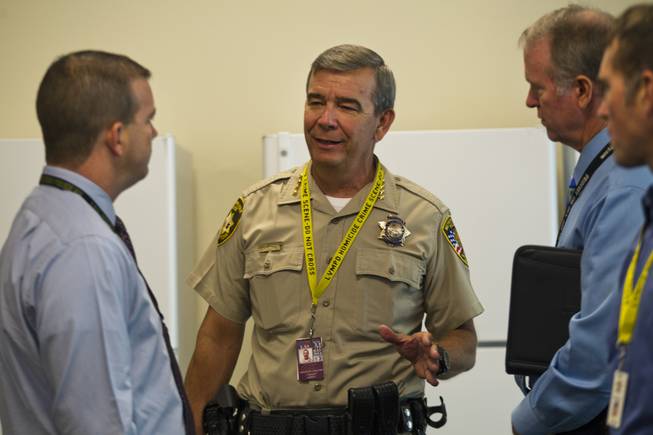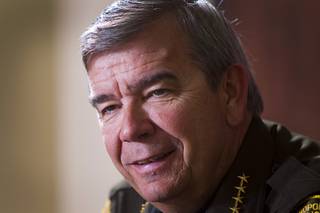
Sheriff Doug Gillespie chats with colleagues before the start of the department’s fiscal affairs committee meeting at the Metro Police headquarters Monday, Oct. 28, 2013.
Tuesday, Jan. 14, 2014 | 2 a.m.
The concrete steps outside Garside Middle School are barely visible as uniform-clad students exit the building on this mid-November afternoon, creating a sea of blue and khaki.
As the students’ chatter fills the brisk air, they pay no attention to the man dressed in a gray suit and vest, complete with a blue tie, who is observing the controlled chaos almost wistfully.
“It brings back memories,” Sheriff Doug Gillespie says.
Thirty-some years ago, this school was part of his domain as a rookie Metro Police officer patrolling neighborhoods near U.S. 95.
Now, Gillespie — who is heading into his eighth and final year in office as sheriff — is here for a related safety reason: He’s on the board of directors for an after-school program at Garside. This day, he will receive an update on its status.
It’s his second-to-last stop of the day, which has included crime briefings with captains, a meeting about health-care costs, a retirement ceremony and a discussion with other state public safety officials. His schedule has taken him to nearly every corner of Las Vegas, and he’s not done yet.
Gillespie ends his day delivering a commencement speech to a group graduating from the Citizens’ Police Academy, a department-run program that fosters community interaction with officers.
His remarks encapsulate all that has changed since Nov. 12, 1980, the day he was hired.
“We can’t do it alone,” Gillespie tells the graduating academy members. “When I started in policing, we thought we could. We did very little outreach in the community.”
Of course, for all that has changed in three decades, some remains the same.
On his first day of duty, Gillespie picked up his officer uniforms: four long pants, four green winter shirts and four khaki summer shirts. New recruits still wear the same ensemble.
• • •
As one of the rare elected sheriffs overseeing a metropolitan police department, a question began dogging Gillespie halfway into his second term: Would he seek a third term in the 2014 election?
Without much ado, Gillespie crafted a letter to be released through the department’s public information office in late August. The letter was the result of months of personal reflection, heightened by a two-week vacation, and many conversations with his wife.
Gillespie had decided no. Eight years in office would be long enough.
“Are you really good for four years on top of what you have to finish?” Gillespie said he asked himself. “My internal clock was saying, ‘I think that’s pushing it.’”
His second term, which began in January 2011, has been filled with challenges. First, there was public scrutiny about officer-involved shootings, which led to a Department of Justice review and changes to Metro’s use-of-force policy. Then in July, Gillespie’s decision to save an officer’s job — against the recommendation of Metro’s Use of Force Review Board — was met with harsh criticism, including the resignation of Assistant Sheriff Ted Moody and several review board members.
Also in late July, Officer David Vanbuskirk fell to his death during a rescue mission on Mount Charleston, creating somber days for the department and Gillespie, who called officer deaths “by far the toughest” days.
And not to be forgotten is the ongoing budget battle, which wasn’t made any easier when news leaked in August that a Metro captain had arranged a private helicopter ride for a Guns N’ Roses member as part of an elaborate marriage proposal. Gillespie’s pleas for a sales tax increase to fund additional police officers have fallen on deaf ears with the Clark County Commission.
Even so, Gillespie insists no single event deterred him from seeking a third term. Rather, the decision came down to what he considers his most important accomplishment — his family, which includes his wife, Louise, and two grown daughters.
“You can do a lot of things at work, but truly what is your legacy?” he says. “That’s my legacy.”
His legacy at Metro is still a work in progress. With 12 months left in office, Gillespie hardly considers himself a lame duck.
He made that clear in the letter announcing his plans to step down as sheriff after completing his second term. Instead of campaigning, Gillespie vowed to focus on what’s been coined the “More Cops” initiative. In other words: Find a way to get the County Commission to pass a sales tax increase that would put more officers on Las Vegas streets.
“There is nothing more important to me and nothing I am more committed to seeing through,” he wrote in his Aug. 26 letter to the community.
• • •
The sheriff’s fifth-floor office boasts a panoramic view of downtown Las Vegas across Interstate 15 and the city’s economic engine — the Strip — to the south.
The view is a stark contrast to where Gillespie grew up: a small town outside of Poughkeepsie, N.Y., where the mailman knew every resident by name. After school as a teen, Gillespie would grab his shotgun and head to his backyard to practice shooting; hunting pheasants was a favored pastime in the area.
“Back then, I didn’t realize how good I had it,” he said. “When I came here as a police officer, I was pretty damn naive.”
Becoming a police officer was always part of his plan, though. In the spring of 1980, Gillespie and his father struck a deal. His dad agreed to pay half of his airfare for a Las Vegas trip if Gillespie tested to become a police officer while there.
Metro called Gillespie that fall and offered him a spot in the next police academy. The 22-year-old arrived that November with a suitcase, the money in his pocket and a college degree.
Nowadays, higher education has become an almost unspoken requirement for incoming police recruits, with 73 percent of the most recent academy class possessing at least a two-year degree. But back then, Gillespie’s bachelor degree in criminal science from the Rochester Institute of Technology was a rarity.
Like many of his sheriff predecessors, Gillespie steadily rose through the ranks, guided by a series of personal mentors within the department. The experience shaped his philosophy that good leaders are those who develop future ones.
Gillespie has another philosophy, a phrase he hesitates to call his motto, but one that would be recognizable to anyone in his inner circle: “If you always do what you’ve always done, you will always get what you always got.”
It harkens to his desire for evolution, whether it’s change precipitated by public request, such as more stringent use-of-force policies and police body cameras, or police techniques enhanced by technology.
And sometimes that meant taking risks. Case in point: Gillespie’s decision to accept an offer from a Department of Justice program to examine 20 years of Metro’s use-of-force incidents.
“It was not without risk,” said Bernard Melekian, the former director of the Justice Department’s Community Oriented Police Services (COPS). “He saw it as an opportunity; he saw it as a way to work on gaining back the public trust, and I think he did it.”
Melekian, who now runs his own law enforcement consulting firm, met with Gillespie several times throughout the COPS program’s analysis of officer-involved shootings plaguing the department. Melekian called Gillespie a thoughtful leader who didn’t succumb to a heightened sense of superiority with his job title.
“When he talked, you could tell he had thought about it,” he said. “It was not just something off the top of his head.”
Change hasn’t always come easy, though. Gillespie has received criticism, particularly from the police union, for instituting too many changes too quickly.
Chris Collins, executive director of the Las Vegas Police Protective Association, declined to comment on Gillespie’s tenure for this story because the sheriff still has a year left in office.
The Great Recession — which came on the heels of massive growth and dropped property values and, thus, tax revenue — played a key role in Gillespie’s drive to innovate, said Greg McCurdy, a former assistant sheriff who retired last year.
“He challenged all of us to be forward-thinkers,” said McCurdy, who is now vice president of corporate security for SLS Las Vegas and SBE. “I understand it. He challenged us to change; he challenged us to be better.”
McCurdy said Gillespie sticks to his convictions despite occasional criticism, which comes with leading a large organization. “Part of being sheriff is being tough-skinned,” McCurdy said.
When Gillespie’s eight years in office come to an end, McCurdy thinks he will be remembered as the sheriff who reduced crime and addressed the controversial issue of officer-involved shootings.
“He recognized we had to do things differently,” McCurdy said, referring to officers’ use of deadly force.
• • •
Gillespie’s advice for his successor is simple: Be yourself.
“Don’t try to be something you’re not,” he said. “What you are got you to where you are today.”
It’s something he has kept in mind through the years. Gillespie doesn’t see himself as a politician, but he admits part of his job as sheriff is being involved in Nevada’s political world. Not everyone will see eye to eye.
Since late summer, Gillespie has been locked in a stalemate with the County Commission regarding the approval of a sales tax increase, which he says is crucial to closing a $30 million budget gap at Metro and avoiding the elimination of officer positions.
In October 2013, the County Commission voted down two proposals to increase the sales tax rate. Next week, the commissioners will consider a third More Cops proposal — this time initiated by Gillespie, with the help of Las Vegas economist Jeremy Aguero.
The “hybrid” proposal would phase in a 0.15 percent sales tax increase, while the department spends down its $136 million reserve account. The new tax revenue would go toward hiring 101 officers over a two-year period, maintaining a ratio of about 1.7 officers per 1,000 residents.
“I’m committed to finding additional revenue to run the Las Vegas Metropolitan Police Department,” Gillespie said. “That’s what we need to do. As long as I’m here, I’m going to continue to present proposals that do just that.”
He’s also concerned about gradual crime increases despite the total number of crimes still being lower than in 2007.
After years of steady crime reductions, violent and property crimes increased in 2012, according to the FBI’s Uniform Crime Report.
Spikes in crime continued last year. Homicides, sexual assaults, burglaries and thefts increased in 2013, according to Metro crime data.
And for the man whose purview includes a multimillion-dollar budget and 4,000-some employees, that’s a problem. As sheriff, Gillespie says his ultimate responsibility is keeping the community safe, which means constantly striving for even lower crime numbers.
For that reason, Gillespie doesn’t intend to begin packing his office — filled with New York Giants memorabilia and a rock painting of his former K9 unit dog, Danko — any time soon.
“I’m not counting the days,” he said. “When the day does come that I am no longer a member of the Las Vegas Metropolitan Police Department, I’m sure there will be some emptiness inside of me.”


Join the Discussion:
Check this out for a full explanation of our conversion to the LiveFyre commenting system and instructions on how to sign up for an account.
Full comments policy